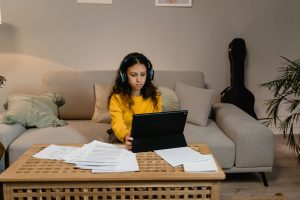
The Future of Education: Navigating the Path to Innovation
Technology is changing schooling in ways imagined a few decades ago. Virtual classrooms and online primary school uk are changing education, empowering students and teachers. This article discusses some of the major trends and developments affecting UK and global education.
Technology-Driven Learning Environments: Technology has transformed education. Technology will increasingly shape learning environments. VR/AR will take pupils outside the classroom. These tools can help pupils explore foreign locations, learn history, and conduct scientific investigations.
AI-enabled adaptive learning platforms are revolutionising education. AI-powered systems can assess student performance and customise learning materials. This personalised approach boosts student engagement and ensures they get the help they need.

Lifelong Learning and Upskilling: The future of education will emphasise lifelong learning and upskilling beyond school. Continuous learning is necessary to stay competitive and flexible as technology changes the employment environment.
Educational institutions and employers are working to offer reskilling and upskilling programmes that meet the needs of a quickly changing employment market. Online courses, professional certificates, and micro-credentials enable career-long learning.
Blending Physical and Virtual Learning: The future of education is a deliberate mix of traditional and virtual learning. Blended learning methods mix face-to-face interactions with online resources to create an engaging learning experience.
Online platforms provide students with tools, multimedia information, and interactive exercises to augment classroom instruction. This method encourages self-directed learning and student agency.
Critical Thinking, Soft Skills: Critical thinking, problem-solving, communication, and adaptation are in demand in an increasingly interconnected and complex world. Early skill development is valued by schools.
These vital soft skills will be taught alongside academics in the future. Project-based learning, collaborative group work, and real-world problem-solving scenarios will be used to teach critical thinking and teamwork.
Global Collaboration and Cultural Interchange: Technology has shrunk the world, and education will promote cultural interchange and collaboration. Virtual classrooms and video conferencing will develop cross-cultural understanding and empathy between students and educators from other countries.
International collaborations allow students to work together, explore different viewpoints, and learn more about global concerns. Interconnectedness will help children become global citizens who value cultural diversity.
In conclusion, education in the UK and beyond will undergo fascinating transformations. Educators, policymakers, and stakeholders must embrace new learning experiences as technology advances while guaranteeing equitable access to quality education. Technology, soft skills, and global collaboration can help education become more inclusive and brighter.
Online School: Thomas Keith is What You Need
Online schools have changed education in recent years. Thomas Keith’s story illustrates the pros and cons of online schooling. We’ll discuss Thomas Keith’s online school experience, including its pros, cons, and inspiring success stories.
Online Education Benefits:

- Flexibility and personalisation: Thomas Keith found online schooling flexible. Online schools let students construct personalised study plans. This flexibility allows students to mix academics with other interests or obligations, promoting work-life balance.
- High-Quality Education: Online schools partner with skilled professors and subject matter experts to give students like Thomas a quality education. Advanced technology and interactive tools boost learning by delivering different educational materials, movies, and virtual simulations.
Online schools offer customised attention and support, as Thomas Keith’s success story shows. Online learning is more personalised due to lower class sizes and dedicated educators. This helps teachers discover and address students’ strengths and problems, fostering academic improvement.
Online Schooling Challenges:
- Self-Discipline and Time Management: Online schooling offers flexibility, but it also requires self-discipline and time management. To stay focused and follow study regimens, students like Thomas need self-regulation abilities. Some students struggle with routines without a classroom.
Online schooling uses digital communication, which may reduce student-teacher face-to-face engagement. Virtual classrooms may impact social growth and interpersonal skills.
Thomas Keith Successes:
- Academic Excellence and Achievement: Thomas Keith School excelled in online education. Your kids have the freedom to study topics that interest them. Your kids will excel academically and have a lifelong love of learning.
Thomas Keith Online schooling allows you to pursue your particular interests while maintaining a challenging academic curriculum. Coding groups and community service helped him develop holistically.
- University and Career Readiness: Thomas Keith online school’s personalised support prepared them for university and a career.
Thomas Keith’s online school experience illuminates its pros, cons, and inspiring success stories. Online schools allow students to thrive academically and explore their passions. Virtual learning involves self-discipline and time management. As online education evolves, it will be crucial to address obstacles while maximising its potential to prepare students like Thomas for success.
Online Primary Schools are Transforming UK Education
Online elementary schools are leading the UK education revolution. These virtual learning platforms provide an appealing alternative to traditional brick-and-mortar schools as technology advances and student and parent demands change. This article discusses how UK online primary schools are transforming education and benefiting kids, parents, and instructors.
Online primary schools are changing education by increasing access to quality education. These schools allow students from around the UK to access high-quality education and skilled teachers. Rural and disabled children can now attend urban schools.
Online elementary schools use technology to personalise learning for each student. Students work at their own speed and receive guidance and resources via adaptable learning systems. This personalised method challenges and engages each child, enhancing learning.
Online primary schools provide students and parents with flexible learning environments. Parents can foster their children’s education at home. Students can benefit from a timetable that better matches their interests and extracurriculars for a more balanced and enriching education.

Multimedia and interactive resources make online elementary schools fun and engaging. These platforms bring subjects to life through instructional games and virtual field trips, unlike textbooks. This engaging and interactive approach inspires young learners to appreciate learning beyond the virtual classroom.
Online elementary schools help pupils with unique needs. These platforms let youngsters with learning disabilities get a customised education. Assistive technologies make online education more inclusive.
Online primary education is empowering teachers and kids. Online platforms allow teachers to use creative approaches, access a multitude of educational materials, and collaborate with peers across. Professional development improves teaching practises, which benefits students.
Online primary schools promote community and collaboration, contrary to popular belief. Virtual classrooms allow students to collaborate and exchange ideas. Online schools also host virtual events and extracurriculars that foster a sense of community.
In conclusion, online primary schools are transforming UK education by removing barriers, personalising learning, and using innovative teaching methods. These platforms empower students and educators, promote learning, and provide quality education. Online education is projected to alter education and brighten students’ futures as technology advances.







